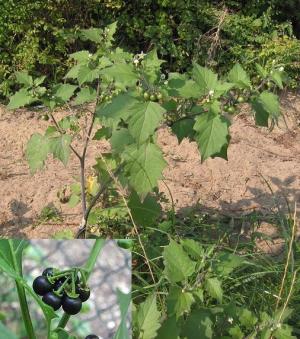Black Nightshade

The toxicity of Black Nightshade (Solanum nigrum) varies widely depending on the variety and the plants growing conditions. All parts of the plant can be poisonous, containing toxic glycoalkaloids at 0.524% (dry weight), including solamargine, solasonine and solanine. The highest risk is posed by the unripe green berries which contain the highest concentration of the toxins. The level of solanine in Solanum nigrum can be extremely toxic and potentially fatal. Adding further risk to ingestion of the plant is that poisoning symptoms are typically delayed for 6 to 12 hours after ingestion; meaning that by the time clinical signs present, it may already be too late. The initial symptoms of toxicity include confusion, drowsiness, fever, sweating, and severe gastrointestinal upset to include; vomiting, abdominal pain, and diarrhea. Deaths reported from the ingestion of Solanum nigrum plant parts was the result of cardiac arrhythmia and respiratory failure. Nitrate toxicity by grazing the leaves of S. nigrum have also fatally poisoned livestock.
Depending upon the amount of the plant ingested the prognosis will vary from good to poor. There is no specific antidote available and treatment is mainly symptomatic and supportive with the emphasis being on respiratory support as death is almost always due to acute respiratory failure. In cases of a witnessed ingestion, where only a small amount of the plant may have been consumed; vomiting should be induced. Activated charcoal is also a valuable tool at neutralizing the ingested toxins in the stomach. The pet should be watched closely for worsening signs of neurological distress and treated accordingly. In many cases of a minor ingestion, the pet will make a full recovery in a matter of hours. Due to the severe gastrointestinal upset that is common with the ingestion of Black Nightshade, fluid and electrolyte replacement may be necessary. If the pet consumed a large amount and is suffering respiratory or cardiovascular distress it may be necessary to intubate the patient and provide oxygen; vasopressors may also be necessary. Diazepam can be used for the control of convulsions. Prevent further ingestion of the plant and contact your veterinarian.




